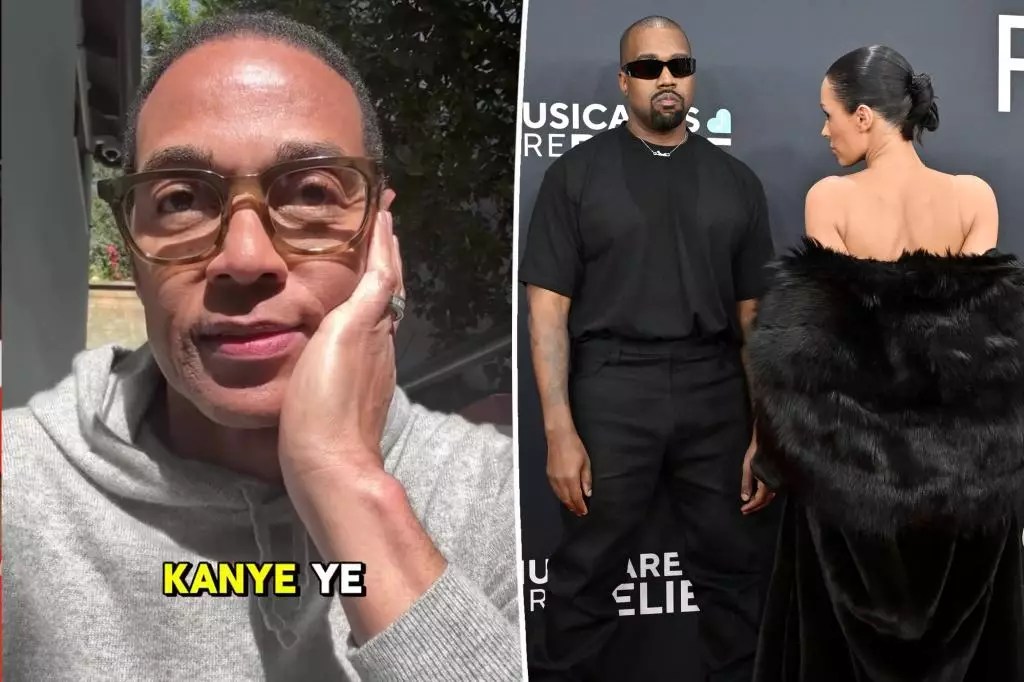The recent public spat between CNN anchor Don Lemon and rapper Kanye West has set the internet ablaze, encapsulating the complex intersection of race, media representation, and celebrity culture. At the heart of the controversy is an accusation from West, who labeled Lemon a “koon” after the anchor allegedly started a rumor about West and his partner, Bianca Censori, being expelled from the Grammy Awards. This altercation highlights not just the personal grievances of two influential figures but also raises questions about respect, responsibility, and the narrative surrounding Black men in America.
During a red carpet event for the 14th Annual NFL Honors in New Orleans, Lemon shared his thoughts with Page Six about the situation, emphasizing the need for mutual respect among Black men. He commented on the serious implications of the term “koon” within their community, imploring West to reconsider his choice of words. This revelation underscores the broader issue of how language can perpetuate stereotypes and hostility, particularly among individuals who are meant to uplift one another.
Lemon found himself in the crosshairs of West’s ire after he reported a rumor that West had been escorted from the Grammys due to their provocative red carpet appearance. However, Lemon seems to stress that he was merely sharing information he came across, not fabricating a story for sensationalism. The nuance in Lemon’s explanation illustrates the challenges media professionals face in navigating sensational headlines while maintaining journalistic integrity.
To further complicate matters, West’s dismissal of Lemon during a pre-ceremony interview suggests a deeper issue: the relationship between artists and the media that covers them. Lemon recalled a moment when West rebuffed his attempts for an interview, making it clear that he was focused elsewhere. This interaction paints a picture of an artist who is not only protective of his narrative but perhaps also burdened by the weight of public scrutiny.
Amidst the drama, both Lemon and fashion-forward Censori’s red carpet appearance reveal West’s uncanny ability to market himself, albeit in sensational ways. Lemon acknowledged West’s talent for marketing and promotion, noting that while the stunt was surprising, the degrees of nudity involved took it to another level. As a master of reinvention, West’s antics bring attention not only to his persona but also to the evolving standards of celebrity indulgence.
The incident also ties into West’s intention to create buzz for his upcoming “Vultures” album, hinting at a calculated maneuver rather than a mere spur-of-the-moment choice. The idea that their provocative display could serve a dual purpose—both artistic expression and promotional strategy—elucidates the complex dynamics of celebrity culture, where controversy often translates into publicity.
Lemon’s rebuttal, delivered through social media, is instructive in understanding the responsibility that comes when wielding a platform. In insisting that he did not ignite the rumor and calling out West for his accusations, Lemon attempted to reclaim control over the narrative being spun. His pointed remark regarding West’s political affiliations emphasized a sense of irony: a musician who has maintained connections with controversial figures dare to cast aspersions on another.
This discourse goes beyond mere celebrity bickering; it encapsulates significant themes of public accountability and the struggle for dignity within marginalized communities. It locates the historical baggage of the term “coon” within the discourse around identity and belonging, elucidating Lemon’s plea for respect as a nuanced demand for dignity against a backdrop of racial and social tensions.
In retrospect, the clash between Lemon and West serves as a reminder that the dialogue surrounding race in America continues to evolve. It raises pertinent questions about representation, dignity, and the responsibility private citizens and public figures have toward one another, especially in the Black community. The unfolding saga is not just a one-off incident; rather, it is reflective of broader societal tensions that deserve scrutiny and dialogue.
In the end, amidst the legal, cultural, and social nuances, it remains imperative to engage in an honest conversation about the respect demanded within our communities while addressing the roles that media portrayals, controversies, and celebrity antics play in shaping public perception.


Leave a Reply